- Home
- Milan Kundera
Testaments Betrayed: An Essay in Nine Parts
Testaments Betrayed: An Essay in Nine Parts Read online
Testaments Betrayed: An Essay in Nine Parts
Milan Kundera
Milan Kundera has established himself as one of the great novelists of our time with such books as The Unbearable Lightness of Being, Immortality and The Book of Laughter and Forgetting. In Testaments Betrayed, he proves himself a brilliant defender of the moral rights of the artist and the respect due to a work of art and its creator’s wishes. The betrayal of both – often by their most passionate proponents – is the principal theme of this extraordinary work. Readers will be particularly intrigued by Kundera’s impassioned attack on society’s shifting moral judgments and persecutions of art and artists, from Mayakovsky to Rushdie.
Milan Kundera
Testaments Betrayed: An Essay in Nine Parts
Translated from the French by Linda Asher
TESTAMENTS BETRAYED. Copyright © 1993 by Milan Kundera. Translation copyright © 1995 by Linda Asher. FIRST EDITION
This book was originally published in France under the title Les testaments trahis.
PART ONE. The Day Panurge No Longer Makes People Laugh
The Invention of Humor
The pregnant Madame Grandgousier ate too much tripe, and they had to give her a purgative; it was so strong that the placenta let go, the fetus Gargantua slipped into a vein, traveled up her system, and came out of his mania's ear. From the very first lines, Rabelais's book shows its hand: the story being told here is not serious: that is, there are no statements of truths here (scientific or mythic); no promise to describe things as they are in reality.
Rabelais's time was fortunate: the novel as butterfly is taking flight, carrying the shreds of the chrysalis on its back. With his giant form, Pantagruel still belongs to the past of fantastic tales, while Panurge comes from the yet unknown future of the novel. The extraordinary moment of the birth of a new art gives Rabelais's book an astounding richness; it has everything: the plausible and the implausible, allegory, satire, giants and ordinary men, anecdotes, meditations, voyages real and fantastic, scholarly disputes, digressions of pure verbal virtuosity. Today's novelist, with his legacy from the nineteenth century, feels an envious nostalgia for the superbly heterogeneous universe of those earliest novelists and for the delightful liberty with which they dwelt in it.
Just as Rabelais starts his book by dropping Gargantua onto the world's stage from his mama's ear, so in The Satanic Verses, after a midair plane explosion, do Salman Rushdie's two heroes fall through the air chattering, singing, and carrying on in comic and improbable fashion. While "above, behind, below them in the void" float reclining seats, paper cups, oxygen masks, and passengers, one of them-Gibreel Farishta-swims "in air, butterfly-stroke, breast-stroke, bunching himself into a ball, spreadeagling himself against the almost-infinity of the almost-dawn," and the other-Saladin Chamcha-like "a fastidious shadow falling headfirst in a grey suit with all the jacket buttons done up, arms by his sides… a bowler hat on his head." The novel opens with that scene, for, like Rabelais, Rushdie knows that the contract between the novelist and the reader must be established from the outset; it must be clear: the story being told here is not serious, even though it is about the most dreadful things.
The marriage of the not-serious and the dreadful: witness this scene from Rabelais's Fourth Book: on the open sea, Pantagruel's boat meets a ship full of sheep merchants; one of them, seeing Panurge with no codpiece and with his eyeglasses fastened to his hat, takes the liberty of talking big and calls him a cuckold. Panurge is quick to retaliate: he buys a sheep from the fellow and throws it into the sea; it being their nature to follow the leader, all the other sheep start jumping into the water. In a panic, the merchants grab hold of the sheeps' fleece and horns, and are dragged into the sea themselves. Panurge picks up an oar, not to save them but to keep them from climbing back onto the ship; eloquently, he exhorts them, describing the miseries of this world and the benefits and delights of the next, declaring that the dead are more fortunate than the living. Even so, should they by some chance prefer to go on living among humans, he wishes them a meeting with some whale, like Jonah. The mass drowning accomplished, the good Frere Jean congratulates Panurge, only reproaching him for having paid the merchant beforehand and thus thrown away money. Says Panurge: "By God, I got a good fifty thousand francs' worth of fun for it!"
The scene is unreal, impossible; does it, at least, have a moral? Is Rabelais denouncing the stinginess of the merchants, whose punishment should please us? Or does he mean to make us indignant at Panurge's cruelty? Or, as a good anticlerical, is he mocking the stupidity of the religious cliches Panurge recites? Guess! Every answer is a booby trap.
Says Octavio Paz: "There is no humor in Homer or Virgil; Ariosto seems to foreshadow it, but not until Cervantes does humor take shape… Humor," he goes on, "is the great invention of the modern spirit." A fundamental idea: humor is not an age-old human practice; it is an invention bound up with the birth of the novel. Thus humor is not laughter, not mockery, not satire, but a particular species of the comic, which, Paz says (and this is the key to understanding humor's essence), "renders ambiguous everything it touches." People who cannot take pleasure from the spectacle of Panurge letting the sheep merchants drown while he sings them the praises of the hereafter will never understand a thing about the art of the novel.
The Realm Where Moral Judgment Is Suspended
If I were asked the most common cause of misunderstanding between my readers and me, I would not hesitate: humor. I had only recently come to France, and I was anything but blase. When a famous professor of medicine asked to meet me because he admired The Farewell Party, I was most flattered. According to him, my novel was prophetic; in my character Skreta, a doctor who treats apparently sterile women at a spa by injecting them secretly with his own sperm from a special syringe, I have hit on the great issue of the future. The professor invites me to a conference on artificial insemination. He pulls a sheet of paper from his pocket and reads me the draft of his own presentation. The gift of sperm must be anonymous, free of charge, and (here he looks me in the eye) impelled by a threefold love: love for an unknown ovum that seeks to accomplish its mission; the donor's love for his own individuality, which is to be perpetuated by the donation; and, third, love for a couple that is suffering, unfulfilled. Then he looks me in the eye again: much as he admires my work, he does have one criticism: I did not manage to express powerfully enough the moral beauty of the gift of semen. I defend myself: this is a comic novel! My doctor is a crackpot! You shouldn't be taking it all so seriously! "So," he says, suspicious, "your novels aren't meant to be taken seriously?" I am baffled, and suddenly I realize: there is nothing harder to explain than humor.
In The Fourth Book, there is a storm at sea. Everyone is on deck struggling to save the ship. All except Panurge, paralyzed with fear, who just whimpers: his great lamentations go on for pages. When the storm abates, his courage returns and he bawls all of them out for their laziness. And this is what's odd: not only does this coward, this liar, this faker, provoke no indignation, but it is at the peak of his braggadocio that we love him most. These are the passages wherein Rabelais's book becomes fully and radically a novel: that is, a realm where moral judgment is suspended.
Suspending moral judgment is not the immorality of the novel; it is its morality. The morality that stands against the ineradicable human habit of judging instantly, ceaselessly, and everyone; of judging before, and in the absence of, understanding. From the viewpoint of the novel's wisdom, that fervid readiness to judge is the most detestable stupidity, the most pernicious evil. Not that the novelist utterly denies that moral judgment is legitimate, but that he refuses it a
place in the novel. If you like, you can accuse Panurge of cowardice, accuse Emma Bovary, accuse Rasti-gnac-that's your business; the novelist has nothing to do with it.
Creating the imaginary terrain where moral judgment is suspended was a move of enormous significance: only there could novelistic characters develop- that is, individuals conceived not as a function of some preexistent truth, as examples of good or evil, or as representations of objective laws in conflict, but as autonomous beings grounded in their own morality, in their own laws. Western society habitually presents itself as the society of the rights of man; but before a man could have rights, he had to constitute himself as an individual, to consider himself such and to be considered such; that could not happen without the long experience of the European arts and particularly of the art of the novel, which teaches the reader to be curious about others and to try to comprehend truths that differ from his own. In this sense E. M. Cioran is right to call European society "the society of the novel" and to speak of Europeans as "the children of the novel."
Profanation
The removal of gods from the world is one of the phenomena that characterize the Modern Era. The removal of gods does not mean atheism, it denotes the situation in which the individual, the thinking ego, supplants God as the basis for all things; man may continue to keep his faith, to kneel in church, to pray at his bed, but his piety shall henceforward pertain only to his subjective universe. Having described this situation, Heidegger concludes: "And thus the gods eventually departed. The resulting void is filled by the historical and psychological exploration of myths."
The historical and psychological exploration of myths, of sacred texts, means: rendering them profane, profaning them. "Profane" comes from the Latin pro-fanum: the place in front of the temple, outside the temple. Profanation is thus the removal of the sacred out of the temple, to a sphere outside religion. Insofar as laughter invisibly pervades the air of the novel, profanation by novel is the worst there is. For religion and humor are incompatible.
Thomas Manns tetralogy, Joseph and His Brothers, written between 1926 and 1942, is an excellent "historical and psychological exploration" of sacred texts, which, recounted in Mann's smiling and sublimely tedious tone, instantly cease to be sacred: God, who in the Bible exists for all eternity, becomes in Mann's work a human creation, the invention of Abraham, who brought him out of the polytheistic chaos as a deity who is at first superior, then unique; recognizing to whom he owes his existence, God cries: "It's unbelievable how well that dust-dumpling knows Me! I'm starting to make a name through him! Truly, I'm going to anoint him!" But above all: Mann emphasizes that his novel is a humorous work. The Holy Scriptures making us laugh! As in the story of Joseph and Potiphar's wife: crazy with love, the woman bites her tongue and then pronounces her seductive lines lisping like a baby, "thleep with me, thleep with me," while the chaste Joseph, day after day for three years, explains patiently to the lisper that they are forbidden to make love. On the fateful day, they are alone in the house; she starts up again, demanding "thleep with me, thleep with me," and he yet again patiently, pedantically explains why they must not make love, but as he explains he gets hard, harder, my God he gets so superbly hard that Potiphar's wife is driven mad by the sight; she rips his garment off him, and when Joseph runs away, still with his erection, she- demented, desperate, enraged-howls and shouts for help, accusing Joseph of rape.
Mann's novel won universal respect; proof that profanity was no longer considered an offense but was henceforward an element of customary behavior. Over the course of the Modern Era, nonbelief ceased to be defiant and provocative, and belief, for its part, lost its previous missionary or intolerant certainty. The shock of Stalinism played the decisive role in this evolution: in its effort to erase Christian memory altogether, it made brutally clear that all of us-believers and nonbelievers, blasphemers and worshipers- belong to the same culture, rooted in the Christian past, without which we would be mere shadows without substance, debaters without a vocabulary, spiritually stateless.
I was raised an atheist and that suited me until the day when, in the darkest years of Communism, I saw Christians being bullied. On the instant, the provocative, zestful atheism of my early youth vanished like some juvenile brainlessness. I understood my believing friends and, carried away by solidarity and by emotion, I sometimes went along with them to mass. Still, I never arrived at the conviction that a God existed as a being that directs our destinies. Anyhow, what could I know about it? And they, what could they know? Were they sure they were sure? I was sitting in church with the strange and happy sensation that my nonbelief and their belief were oddly close.
The Well of the Past
What is an individual? Wherein does his identity reside? All novels seek to answer these questions. By what, exactly, is the self defined? By what a character does, by his actions? Yet action gets away from its author, almost always turns on him. By his mental life, then? By his thoughts, by his hidden feelings? But is a man capable of self-understanding? Can his secret thoughts be a key to his identity? Or, rather, is man defined by his vision of the world, by his ideas, by his Weltanschauung? This is Dostoyevsky's aesthetic: his characters are rooted in a very distinctive personal ideology, according to which they act with unbending logic. For Tolstoy, on the other hand, personal ideology is far from a stable basis for personal identity: "Stepan Arkadievich chose neither his attitudes nor his opinions, no, the attitudes and opinions came to him on their own, just as he chose neither the style of his hats nor of his coats but got what people were wearing" (Anna Karenina). But if personal thought is not the basis of an individuals identity (if it has no more importance than a hat), then where do we find that basis?
To this unending investigation, Thomas Mann brought his very important contribution: we think we act, we think we think, but it is another or others who think and act in us: that is to say, timeless habits, archetypes, which-having become myths passed on from one generation to the next-carry an enormous seductive power and control us (says Mann) from "the well of the past."
Thomas Mann: "Is man's 'self' narrowly limited and sealed tight within his fleshly ephemeral boundaries? Don't many of his constituent elements come from the universe outside and previous to him?… The distinction between mind in general and individual mind did not preoccupy people in the past nearly so powerfully as it does us today…" And again: "We may be seeing a phenomenon which we would be tempted to describe as imitation or continuation, a notion of life in which each persons role is to revive certain given forms, certain mythical schema established by forebears, and to allow them reincarnation."
The conflict between Jacob and his brother Esau is only a replay of the old rivalry between Abel and his brother Cain, between God's favorite and the neglected, jealous one. This conflict, this "mythical schema established by forebears," finds its new avatar in the destiny of Jacob's son Joseph, himself one of the favored. Impelled by the immemorial sense of the favored one as culpable, Jacob sends Joseph to reconcile with his jealous brothers (an ill-fated move: they will cast him into a well).
Even suffering, that seemingly ungovernable reaction, is only "imitation and continuation": when the novel gives us the words and behavior of Jacob mourning Joseph's death, Mann comments: "This was not his usual style of speech… Noah had previously used analogous or similar language about the flood, and Jacob adopted it… His despair was expressed in formulas that were more or less traditional… though this should not cast the slightest doubt on his spontaneity." An important note: imitation does not mean lack of authenticity, for the individual cannot do otherwise than imitate what has already happened; sincere as he may be, he is only a reincarnation; truthful as he may be, he is only a sum of the suggestions and requirements that emanate from the well of the past.
Coexistence of Various Historical Periods Within a Novel
I think back to the time when I was beginning to write The Joke: from the start, and very spontaneously, I knew that through the cha
racter Jaroslav the novel would cast its gaze into the depths of the past (the past of folk art) and that the "I" of my character would be revealed in and by this gaze. In fact, all four protagonists are created that way: four personal communist universes grafted onto four European pasts: Ludvik: the communism that springs from the caustic Voltairean spirit; Jaroslav: communism as the desire to reconstruct the patriarchal past that is preserved in folklore; Kostka: communist Utopia grafted onto the Gospel; Helena: communism as the wellspring of enthusiasm in a homo sentimentalis. Each of these personal universes is caught at the moment of its dissolution: four forms of communism's disintegration; which also means the collapse of four ancient European ventures.
In The Joke, the past appears only as a facet of the characters' psyches, or in essayistic digressions; later, I wanted to put it directly on stage. In Life Is Elsewhere, I set the life of a young poet of our time against the backdrop of the whole history of European poetry so that his own footsteps should mingle with those of Rimbaud, of Keats, of Lermontov. And I went still further, in this mingling of different historical periods, in Immortality.
As a young writer, in Prague, I detested the word "generation," whose smell of the herd put me off. The first time I had the sense of being connected to others was later, in France, reading Terra Nostra by Carlos Fuentes. How was it possible that someone from another continent, so distant from me in itinerary and background, should be possessed by the same aesthetic obsession to bring different historical periods to coexist in a novel, an obsession that till then I had naively considered to be mine alone?

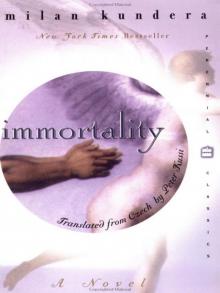 Immortality
Immortality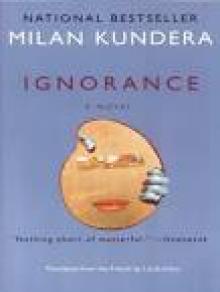 Dr. Havel After Twenty Years
Dr. Havel After Twenty Years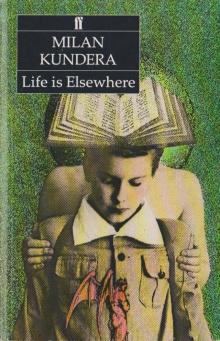 Life Is Elsewhere
Life Is Elsewhere Laughable Loves
Laughable Loves Symposium
Symposium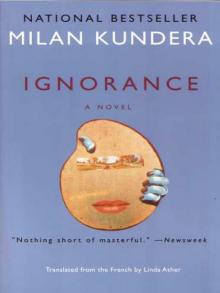 Ignorance
Ignorance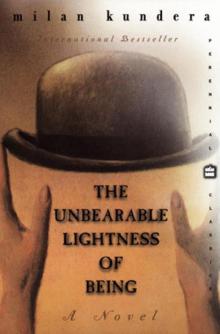 The Unbearable Lightness of Being
The Unbearable Lightness of Being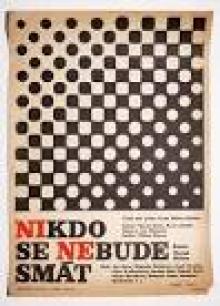 Nobody Will Laugh
Nobody Will Laugh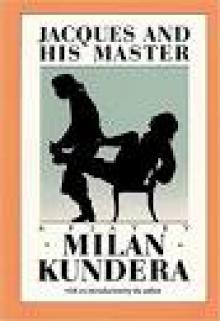 Jacques and His Master: An Homage to Diderot in Three Acts
Jacques and His Master: An Homage to Diderot in Three Acts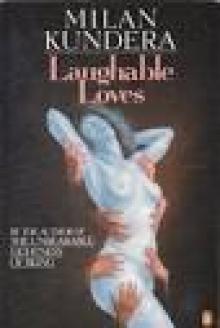 The Golden Apple of Eternal Desire
The Golden Apple of Eternal Desire Eduard & God
Eduard & God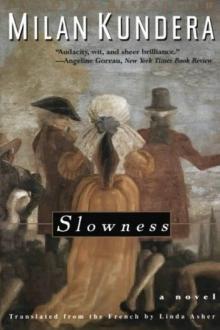 Slowness
Slowness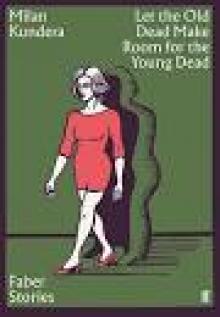 Let the Old Dead Make Room for the New Dead
Let the Old Dead Make Room for the New Dead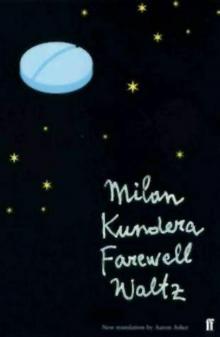 Farewell Waltz
Farewell Waltz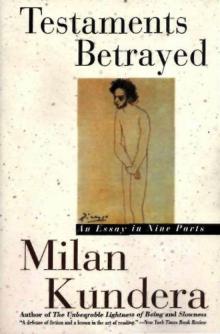 Testaments Betrayed: An Essay in Nine Parts
Testaments Betrayed: An Essay in Nine Parts